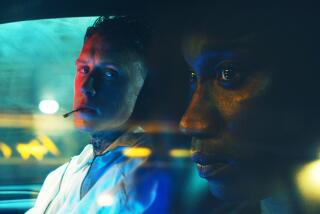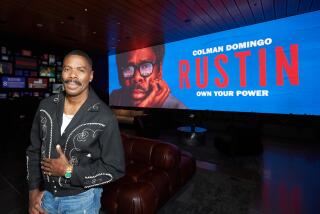Review: ‘Stonewall’ tries but shortchanges pivotal gay rights moment
Viewers have several ways to approach director Roland Emmerich’s “Stonewall,” the latest cinematic look at the 1969 Stonewall riots, considered ground zero for the gay liberation movement and the fight for LGBT equality.
As a fact-meets-fiction snapshot of what life was like — legally, politically, emotionally, sexually — for gay men and women more than 45 years ago, the film is a vital, evocative reminder of a turbulent time that paved the way for hard-fought freedoms. For that alone, it’s of value for younger audiences, gay or straight.
SIGN UP for the free Indie Focus movies newsletter >>
However, for older moviegoers, particularly those LGBT viewers who may have lived through the era depicted in “Stonewall,” the movie may feel simplistic and overly familiar. And that’s not just because much of the same territory has been covered in such films as the 1996 drama also titled “Stonewall” and the fine 2010 documentary “Stonewall Uprising.”
As involving and moving as this “Stonewall” may be, an artifice is at work here, a preciousness to the script by Jon Robin Baitz that sometimes overtakes the film’s better instincts. The proceedings can seem less like a fresh retelling of a seminal story and more like, despite stabs at grit and terror, a theatricalized, dewy-eyed version of days past. (The film’s re-creation of Greenwich Village and environs on Montreal soundstages, although carefully wrought and perhaps budgetarily essential, doesn’t help.)
Like the 1996 “Stonewall,” this new iteration is seen through the eyes of a corn-fed Midwestern gay boy new to the changing Christopher Street scene. High school senior Danny Winters (Jeremy Irvine, quite good), is tossed from his Indiana home after he’s caught having sex with classmate — and football teammate — Joe (Karl Glusman). Fueled in part by his desire to attend Columbia University in the fall, Danny makes his way to the Big Apple.
Danny’s learning curve is relatively quick, though not entirely painless, as he falls in with a circle of homeless so-called scare queens led by streetwise Puerto Rican prostitute Ray, a.k.a. Ramona (a fearless Jonny Beauchamp), and begins to live his version of “the life.” This includes tricking (among the film’s weaker scenes), sharing a seedy hotel room with other disenfranchised kids, getting pummeled by bigoted cops and standing up for his newfound beliefs.
Most integrally, Danny hangs out at the storied Stonewall Inn. The oft-raided, Mafia-owned bar run by a corrupt career criminal (Ron Perlman) proves a magnet and relatively safe haven for lesbian, gay, bisexual and transgender folks looking for a place to meet, drink, dance and, if need be, hustle. (At the time, it was illegal for the place to serve alcohol or for gay patrons to dance together.)
Unlike Ray, Queen Cong (Vladimir Alexis), Little Orphan Annie (Caleb Landry Jones) and Marsha P. Johnson (Otoja Abit), Danny keeps his country boy persona intact. This helps attract the attention of Trevor Nichols (Jonathan Rhys Meyers), a handsome older activist working with the Mattachine Society, the early gay rights organization.
Romantic sparks fly between Danny and the circumspect Trevor, resulting in a bit of soapy melodrama. This also creates tension between Danny and his unlikely friend Ray, who’s clearly fallen for Danny too.
All roads lead to the Stonewall riots, which started June 28 — not for nothing, some have said, less than a day after the funeral of gay icon Judy Garland. Despite certain malleable facts about the uprising, it’s generally agreed that the riots were a spontaneous reaction to ongoing police harassment, prompted by a botched raid on the Stonewall Inn led by vice squad officer Seymour Pine (well played here by Matt Craven).
Emmerich is no stranger to directing scenes of mayhem. He is, after all, the director of “Independence Day” and “The Day After Tomorrow.” Here he portrays the pivotal riot sequence with tension, vigor and no small amount of visceral triumph.
The filmmaker has, however, been accused of whitewashing reality. Of particular note has been Emmerich’s depiction of Danny — a white, blond, “straight-acting” male — throwing the brick that sets off the revolt. This choice, some say, effectively back-burners the lesbians, drag queens and trans women of color so fundamentally present that night. Emmerich also has been condemned for not casting transgender actors in trans roles. The filmmaker has defended his actions on Facebook, calling the movie “a labor of love,” one that “deeply honors the real-life activists who were there.”
Opinions are sure to vary based on one’s background and life experience. What most audiences are more likely to agree on are the film’s at-times overly earnest emotions, particularly during scenes set in Danny’s bucolic hometown. (Some of these moments elicited unintended laughter from a preview screening audience. It’s not a movie for cynics.)
In Emmerich’s defense, the feelings presented throughout the film come from a real, recognizable place. But Baitz’s dialogue, although sincere and affecting, can come off a bit pat for such an accomplished playwright (“Other Desert Cities”) and TV writer (“Brothers & Sisters”). That cast members, especially Irvine, Beauchamp and Joey King as Danny’s devoted younger sister, sell Baitz’s words as well as they do is a testament to the actors’ commitment to the essentially heartfelt, meaningful material.
------------
‘Stonewall’
MPAA rating: R for sexual content, language, violence, drug use
Running time: 2 hours, 9 minutes
Playing: AMC Century City 15; Sundance Sunset, Los Angeles
More to Read
Only good movies
Get the Indie Focus newsletter, Mark Olsen's weekly guide to the world of cinema.
You may occasionally receive promotional content from the Los Angeles Times.






